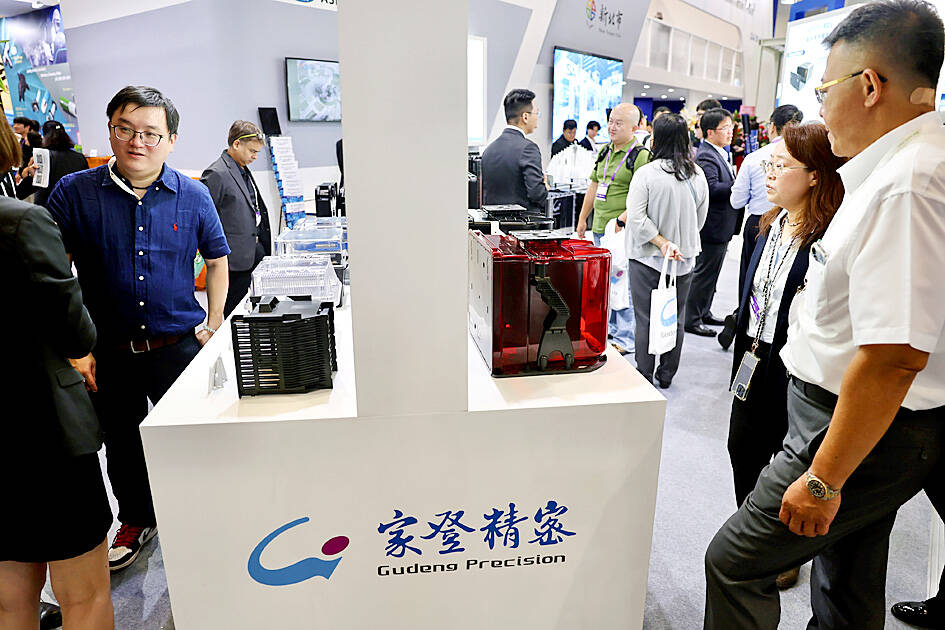Gudeng Precision Industrial Co (家登精密), the sole extreme ultraviolet (EUV) pod supplier to Taiwan Semiconductor Manufacturing Co (TSMC, 台積電), is aiming to expand revenue to NT$10 billion (US$304.8 million) this year, as it expects the artificial intelligence (AI) boom to drive demand for wafer delivery pods and pods used in advanced packaging technology.
That suggests the firm’s revenue could grow as much as 53 percent this year, after it posted a 28.91 percent increase to NT$6.55 billion last year, exceeding its 20 percent growth target.
“We usually set an aggressive target internally to drive further growth. This year, our target is to surpass NT$10 billion,” Gudeng chairman Bill Chiu (邱銘乾) told reporters on the sidelines of the company’s annual year-end party in New Taipei City on Saturday.

Photo: CNA
Revenue growth this year would primarily come from the core wafer pod business, including box-like front-opening unified pods for less advanced wafers and EUV pods, thanks to new factories launched by customers in Taiwan, China and South Korea, Chiu said.
“We have to thank the gentleman wearing the leather jacket [Nvidia Corp chief executive Jensen Huang (黃仁勳)] for creating the demand. AI demand could be enormous when such features become popular on edge devices,” he said.
Reticle boxes and EUV pods made up about 60 percent of Gudeng’s total revenue during the first 11 months of last year, the company said.
TSMC utilizes EUV tools to produce its advanced 5-nanometer, 4-nanometer and 3-nanometer chips.
Wafer pods accounted for 35 percent to 40 percent of the firm’s total revenue over the 11-month period. They are used to transport wafers in the manufacturing process on less advanced technology.
New front-opening unified pods and front-opening shipping pods used in the advanced chip-on-wafer-on-substrate technology, would be another growth driver, Chiu said.
A front-opening shipping pod is used to transfer the wafer from the wafer fabrication unit to the semiconductor manufacturing unit, while a front-opening unified pod stores and moves the wafer from one process to another in a factory.
Those pods have been adopted by TSMC, ASE Technology Holding Co (日月光投控), the world’s largest chip packaging and testing services provider, and a US-based chipmaker, Gudeng said.
The company said its new aviation subsidiary, Jyr Aviation Component Co (朝宇航太科技), would also contribute to this year’s growth in revenue.
The aviation business reported that revenue more than doubled to NT$400 million last year from NT$180 million in 2023.
It has secured deals to supply aircraft landing gear barrels to General Electric Co, Boeing Co and Parker Hannifin Corp.

Intel Corp chief executive officer Lip-Bu Tan (陳立武) is expected to meet with Taiwanese suppliers next month in conjunction with the opening of the Computex Taipei trade show, supply chain sources said on Monday. The visit, the first for Tan to Taiwan since assuming his new post last month, would be aimed at enhancing Intel’s ties with suppliers in Taiwan as he attempts to help turn around the struggling US chipmaker, the sources said. Tan is to hold a banquet to celebrate Intel’s 40-year presence in Taiwan before Computex opens on May 20 and invite dozens of Taiwanese suppliers to exchange views

Application-specific integrated circuit designer Faraday Technology Corp (智原) yesterday said that although revenue this quarter would decline 30 percent from last quarter, it retained its full-year forecast of revenue growth of 100 percent. The company attributed the quarterly drop to a slowdown in customers’ production of chips using Faraday’s advanced packaging technology. The company is still confident about its revenue growth this year, given its strong “design-win” — or the projects it won to help customers design their chips, Faraday president Steve Wang (王國雍) told an online earnings conference. “The design-win this year is better than we expected. We believe we will win

Chizuko Kimura has become the first female sushi chef in the world to win a Michelin star, fulfilling a promise she made to her dying husband to continue his legacy. The 54-year-old Japanese chef regained the Michelin star her late husband, Shunei Kimura, won three years ago for their Sushi Shunei restaurant in Paris. For Shunei Kimura, the star was a dream come true. However, the joy was short-lived. He died from cancer just three months later in June 2022. He was 65. The following year, the restaurant in the heart of Montmartre lost its star rating. Chizuko Kimura insisted that the new star is still down

While China’s leaders use their economic and political might to fight US President Donald Trump’s trade war “to the end,” its army of social media soldiers are embarking on a more humorous campaign online. Trump’s tariff blitz has seen Washington and Beijing impose eye-watering duties on imports from the other, fanning a standoff between the economic superpowers that has sparked global recession fears and sent markets into a tailspin. Trump says his policy is a response to years of being “ripped off” by other countries and aims to bring manufacturing to the US, forcing companies to employ US workers. However, China’s online warriors